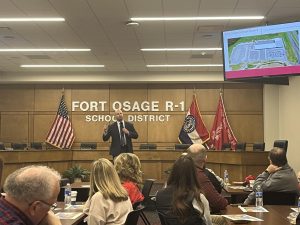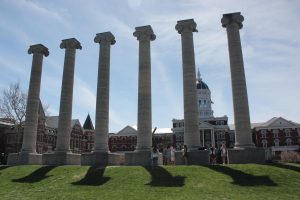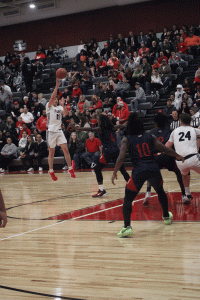Flag bearing: Symbolic speech or harassment?
November 12, 2018
Symbolic speech is protected under the First Amendment, ensuring United States citizens can express themselves when words are not an option. For Fort Osage High School administrators, if symbolic speech can be just as loud, it can be just as disruptive in the classroom. The FOHS Signal staff wonders how far symbolic speech can go before it breaks school policy and if the school has the right to silence it.
The school’s Gay-Straight Alliance celebrated National Coming Out Day on Oct. 11. According to the Human Rights Campaign, “Every year on National Coming Out Day, we celebrate coming out as lesbian, gay, bisexual, transgender, queer (LGBTQ) or as an ally.” On this day, some students failed to show compassion. The day after, those same students showed contempt.
In response to LGBTQ students carrying LGBTQ flags, other students brought in United States flags as a counter the next day. We noticed this move had three major effects: 1) It subconsciously told LGBTQ students they are not American. 2) It made LGBTQ students and their supporters seem un-American for being offended by the stars and stripes. 3) It steered the debate towards symbolic speech rather than homophobia.
If people wearing the US flag were criticized for being homophobic, they hid behind saying they were patriotic. The US already has multiple National Holidays where anyone can wave the flag. We feel this was a dedicated, organized plan to attack LGBTQ students with false patriotism. There were people who did not intend this and got swept into the movement, who just wanted to have a discussion about pride. These people truly believe that they should be able to bear the US flag to show their pride in the same way that LGBTQ students can bear their flag to show pride. The intent of LGBTQ students was not to cause discomfort or discord, but to simply show their pride. Students who bore the US flag and used it in a way to cause discomfort or discord to others caused a disruption to the school day. In this case, the symbolic speech of wearing the US flag discriminated on the basis of sex and gender, thus creating a hostile environment and breaking school policy.
According to Board Policy 2130, “it is the policy of the District to maintain a learning environment that is free from harassment.” It goes into further detail, stating that the school protects students by prohibiting “any and all forms of unlawful harassment and discrimination.”
The Department of Labor defines unlawful harassment and discrimination as being “unwelcome and based on the victim’s protected status” and must be determined both “subjectively abusive to the person affected, and objectively severe and pervasive enough to create a work environment that a reasonable person would find hostile or abusive.”
Certain students who wore the US flag were told by administrators to put the US flags away because it was causing a disruption. In response, questions were raised about the legitimacy of the school’s actions. This was one of the effects of wearing the US flag. It shifted the debate into a discussion about symbolic speech rather than the merits of what was being expressed. The FOHS Signal staff wonder if a moral motivation was enough for administrators to take action. Did administrators need legal justification?
On Dec. 14, 1965 in Iowa, teachers at Des Moines schools learned that students from the Tinker family planned to wear black armbands in protest of the Vietnam War. Administrators suspended students and the school district was sued. In Tinker V. Des Moines, the supreme court justices ruled on the side of the students in this case, revolutionizing the status of student’s constitutional rights, while setting clear guidelines.
The precedent those supreme justices set proves that school administrators had the legal justification. “They must reasonably forecast that the student speech will cause a substantial disruption.” We feel that school administrators were both morally justified in trying to prevent harassment against LGBTQ students and legally justified in trying to prevent disruption. We do not believe it is school policy that needs change, rather, our tolerance.





